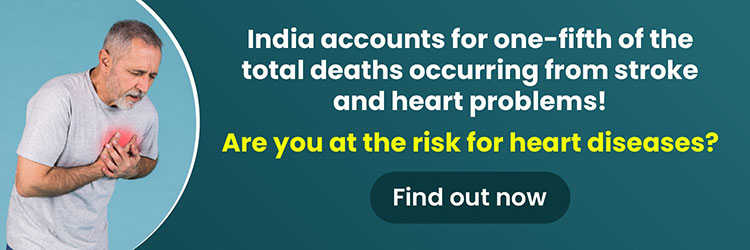Skipped, Rapid, or Irregular Heartbeat: Should You Be Concerned?
23 months ago
3 minute read.

Have you ever felt your heart suddenly racing? It's like your heart is trying to tell you something. These moments when your heart goes offbeat, faster than usual, or feels like it's doing somersaults are what we call heart palpitations.
Heart palpitations are when your heart suddenly beats very fast, flutters, or feels like it's pounding. You might feel this in your throat, chest, or neck. Usually, this isn't something to be worried about because your heart is still doing its job well.
But sometimes, these heart palpitations can be a sign of a more serious heart problem, like an irregular heartbeat, which may need treatment. So, it's essential to pay attention if you often have heart palpitations and talk to a doctor to be sure everything is okay.

What causes heart palpitations?
Heart palpitations are sensations of rapid, strong, or irregular heartbeats. While there can be various causes for heart palpitations, the ones you mentioned are indeed common triggers:
- Stress, anxiety, fear, or panic attacks: Emotional stress and anxiety can stimulate the release of stress hormones, which can affect your heart rate and rhythm, leading to palpitations.
- Vigorous physical activity: Intense exercise can increase your heart rate and cause palpitations temporarily. It is often considered a normal response to physical exertion.
- Fever: Elevated body temperature due to fever can also affect your heart rate.
- Diet pills: Some over-the-counter or prescription diet pills contain stimulants that can lead to an increase in heart rate and palpitations.
- Drugs: Certain drugs, such as cocaine, amphetamines, and ecstasy, can have stimulant effects on the heart, leading to palpitations and other cardiac issues.
- Nicotine : Nicotine is a stimulant found in tobacco products. Smoking or using nicotine-containing products like cigarettes, cigars, or e-cigarettes can lead to an increase in heart rate and palpitations.
- Caffeine: Excessive caffeine intake, typically from coffee, energy drinks, or some medications, can stimulate the heart and cause palpitations in sensitive individuals.
It's important to note that while these factors can trigger palpitations, they are not always the cause. Palpitations can also be a sign of an underlying heart condition or other medical issues.
Symptoms of heart palpitation
Heart palpitations might make you feel as if your heart is:
- Racing
- Having an extra beat
- Pounding
- Missing a beat
- Flip-flopping
- Fluttering
An irregular heartbeat is more likely to be the cause of palpitations if you have:
- Heart disease
- Significant risk factors for heart disease
- An abnormal heart valve
- Abnormal blood levels of potassium
- low oxygen level in the blood
- Overactive thyroid
- Certain medicines used to treat high blood pressure, heart problems or asthma
Management for heart palpitations
Managing heart palpitations involves addressing the underlying cause and adopting a healthy lifestyle. Here are some tips:
- Stress reduction: Practice stress-reduction techniques like deep breathing, meditation, or yoga to manage anxiety and emotional triggers.
- Limit stimulants: Reduce or eliminate caffeine, alcohol, and nicotine from your diet if they trigger palpitations.
- Regular exercise: Do regular, moderate exercise to improve overall cardiovascular health.
- Healthy diet: Adopt a healthy diet with plenty of fruits and vegetables, whole grains, and lean proteins.
Also check: Keep your heart healthy during winter
When to seek medical help immediately
Seeking medical help immediately is crucial if you experience heart palpitations accompanied by the following symptoms:
- Pain and chest discomfort: If you have palpitations with chest pain or discomfort, don't wait—seek medical attention promptly. It could be a sign of a heart problem that needs urgent evaluation.
- Severe dizziness: Feeling extremely dizzy or lightheaded in conjunction with palpitations could indicate an underlying issue with your heart or circulation. It warrants an immediate medical assessment.
- Severe shortness of breath and fainting: Palpitations that lead to severe shortness of breath or cause you to faint can be a sign of a serious cardiac concern.
- Unusual sweating: If you break out in unusual, profuse sweating during palpitations, it might signal a significant problem. Don't delay; seek medical care promptly.
- Loss of Alertness: If you become disoriented, confused, or lose consciousness during palpitations, it's a critical situation that requires immediate medical attention.
Leave a Comment
Related Articles
Health Checks @ Home
Service
Explore
© 2025 Truworth Health Technologies Pvt. Ltd.






